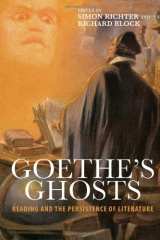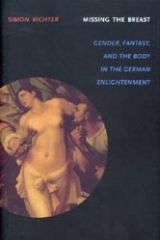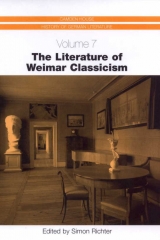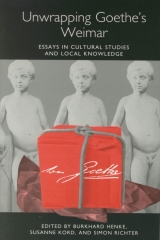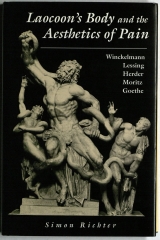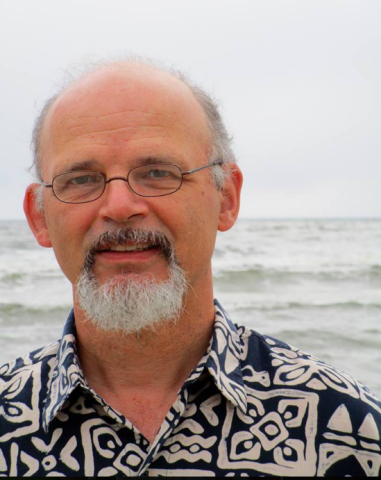
Class of 1965 Endowed Term Professor of German
Simon Richter is a scholar of German and Dutch literature and culture. He is a member of the Graduate Group in Comparative Literature, a faculty fellow of Perry World House and of the Penn Institute of Urban Research, a faculty advisory board member of the Water Center at Penn, and affiliated with the Programs in Cinema and Media Studies, Penn Program in Environmental Humanities, and Gender, Sexuality, and Women's Studies. Courses he has recently taught include: “Water Worlds: Cultural Responses to Sea Level Rise and Catastrophic Flooding”; "Forest Worlds: Mapping the Arboreal Imaginary"; "Writing in Dark Times"; "Erinnerungsorte/Places of Memory"; and "The Long Eighteenth Century." From 2014-2019, Richter directed a hybrid online/study abroad course called "Comparative Cultures of Sustainability in Germany and the Netherlands," which involved an intensive study visit to Berlin and Rotterdam. Click here for a short video about the program, read an article about the program in Omnia, or read about a visit to a floating farm in Rotterdam. He currently offers a Penn Global Seminar on "Comparative Cultures of Resilience in the Netherlands and the US," which involves a study trip to the Netherlands.
Simon's research focuses on cultural aspects of the climate emergency, especially with regard to resilience, adaptation, and sustainability in Germany, Indonesia, the Netherlands (includimg the islands of the Dutch Caribbean), and the United States. As an environmental humanist, Richter engages in activities that blur distinctions between traditional scholarship, urban design, and environmental activism. In 2018/19, he was a member of One Resilient Semarang, an international team of urban designers, hydrological engineers, ecologists, and urban and environmental activists from Indonesia, the Netherlands and the United States. One Resilient was one of two winners in the Water as Leverage urban design competition for Semarang, Indonesia, a coastal city in Northern Java that is rapidly subsiding and facing numerous water challenges. As an "embedded humanist," Simon provided intercultural expertise and critical and creative feedback about the design process. He blogged about the role of storytelling in international policy and design transfer for the IHE Delft Institute for International Water Education: "The Dutch International Water Sector Needs Storytellers." In 2020, he joined One Architecture's team in the Resilience by Design program for the Metropolitan Region of Amsterdam. For a statement on this new pragmatic direction in the environmental humanities, read "Wissenschaft in the Age of Sea Level Rise: What Water Teaches." In "The Translation of Polder: Water Management in the Netherlands and Indonesia," Simon does a deep dive into the cultural history of the polder. As Poldergeist, he tweets about life below sea level.
Together with fine arts professor Joshua Mosley, Simon co-directs the Penn Animation as Research Lab. PAR Lab collaborates with experts in the sciences and humanities to produce animated artworks that communicate emerging research related to climate change and the environment. PAR Lab provides a unique opportunity for students interested in science, art and culture to engage impactfully with complex topics in order to advance public understanding. Through Project Poldergeist, an ongoing experiment in combining video animation and climate science to inform and influence policy makers and the public about difficult and controversial aspects of climate adaptation in the Netherlands, Simon has become a noted participant in the Dutch national conversation. He was featured in a TV documentary (De klimaatverkenner), was interviewed on Dutch national public radio, and has given keynote lectures at various professional and academic gatherings. Videos in the Poldergeist series can be accessed here.
In a related project, Simon co-produced a documentary film based on workshops about future climate migration in the Netherlands and across the German border that he and Patrick Nederkoorn, a prominent Dutch comedian, led in three sets of paired Dutch and German cities or towns (Münster and Enschede, Vreden and Winterswijk, and Venlo and Krefeld) and curated an exhibition in the Haus der Niederlande in Münster called Plan D: Niederländische Klimaflucht nach Deutschland, which drew more than 1600 visitors. The project, which involved preliminary research conducted in a climate resilience studio led by Penn Design professor Matthijs Bouw, brought German and Dutch residents together with experts to negotiate the principles of a future peace in three parts: peace with each other, peace with strangers, and peace with nature. Simon and Patrick are planning to expand the focus of their efforts towards the idea of the new Randstad, a regional conurbation of Dutch and German cities in the Rhine watershed.
At Penn, Simon is a "climate emergency gadfly." His goal is to raise awareness about the climate emergency and to motivate people and institutions to take unprecedented action. Along with other faculty and students, he argues for the inclusion of the climate emergency as a fundamental starting point for all education. In September 2019, he organized a series of twenty 1.5 Minute Climate Lectures. Click here for a short video mashup. In September 2020, he worked with a team of students, staff and faculty to organize the first ever Climate Week at Penn. You can read about it here. Simon is a member of the faculty senate committee on the institutional response to the climate emergency. He co-authored Bring it Home: Practical Ways for Penn Faculty and Staff to Respond to the Climate Emergency.
Simon is currently engaged in two major research projects.
- Too Deep to Fail: A Guide to How the Netherlands is Responding to Sea Level Rise.
- The Strange Afterlife of William of Orange and Philipp II: History, Allegory and Critique in German Literature 1933-1953.
Before taking an environmental turn, much of Simon's research was focused on the history of the body; gender and sexuality; and media in German and Dutch culture from the eighteenth-century to the present. Women, Pleasure, Film: What Lolas Want, a typology of the Lola film from Marlene Dietrich to Franka Potente and beyond, was his most recent book. (Click here for an article about Richter's book.) Other books include Missing the Breast: Gender, Fantasy and the Body in the German Enlightenment and Laocoon's Body and the Aesthetics of Pain. His 1996 article on "The Ins and Outs of Intimacy: Gender, Epistolary Culture, and the Public Sphere" won the Max Kade Prize for Best Article in the German Quarterly. Unwrapping Goethe's Weimar: Essays in Cultural Studies and Local Knowledge (co-edited with Susanne Kord and Burkhard Henke) appeared in late 1999 in conjunction with the 250th anniversary of Goethe's birth. Richter also edited volume seven of the Camden House History of German Literature, The Literature of Weimar Classicism (2005). A brief version of his introduction to this volume is accessible online in The Literary Encyclopedia. Camden House published Goethe's Ghosts: Reading and the Persistence of Literature, a festschrift for the esteemed Goethe scholar Jane Brown, co-edited with Richard Block, in 2013. His article on "Goethe's Faust and the Ecolinguistics of <Here>" is in German Ecocriticism in the Anthropocene (2017). He has published articles in the areas of history of medicine, LBQT studies, gender studies, film studies, aesthetics, opera and literature, German foodways, cinema studies, cultural studies, environmental humanities, Nazi-era and postwar literature, and on authors such as Sophie von La Roche, Theresa Huber, Caroline von Wolzogen, Sophie Mereau, Winckelmann, Lessing, Heinse, Herder, Goethe, Moritz, Schiller, Wilhelm von Humboldt, Hegel, Eichendorff, Habermas, Max Frisch, Fritz von Unruh, Gerard Reve, Boudewijn Büch and Rammstein.
Simon is an enthusiastic undergraduate and graduate teacher. He was awarded the Ira H. Abrams Memorial Award for Distinguished Teaching in 2008 and the Dennis M. DeTurck Award for Innovation in Teaching in 2024. Students in "Writing in Dark Times" worked with Richter to prepare a pop-up book exhibition using the unique Nazi-era holdings of Penn's Special Collections that was profiled in Omnia. In summer 2005 and 2006 he initiated and directed “The Graduate School Experience,” a program designed to give a select group of rising juniors from colleges and universities a foretaste of graduate studies in German. This program was cosponsored by the DAAD and the Max Kade Foundation and continues in rotation among a handful of universities, returning to Penn in 2016 and 2018. Simon is the past president of the Goethe Society of North America, a lively organization that prides itself in cultivating younger generations of Goethe scholars, and former editor of the Goethe Yearbook. He serves on the editorial board of the Periodical of the English Goethe Society, the International Journal of Global Community, and Blue Papers. He has served on the editorial board of German Quarterly, Eighteenth-Century Studies, and The Journal of the History of Sexuality.
Simon speaks Dutch and German fluently and has intermediate competence in Indonesian. He is a past recipient of fellowships from the Alexander von Humboldt Foundation and the ACLS among others.
Research Interests
cultural history of water management and forestry, climate adaptation, energy transitions, 18th-century literature, gender studies, cultural studies, food studies, cinema studies, history of the body, environmental humanities, 20th-century history novel, Dutch literature and culture, using the arts for climate action and advocacy
Affiliations
Member of Graduate Group in Comparative Literature, Affiliate Faculty Member in Cinema and Media Studies; Gender, Sexuality and Women's Studies; and the Penn Program in Environmental Humanities, Faculty Fellow at the Penn Insititute for Urban Research and Perry World House.

 Germanic Languages and Literatures
Germanic Languages and Literatures
